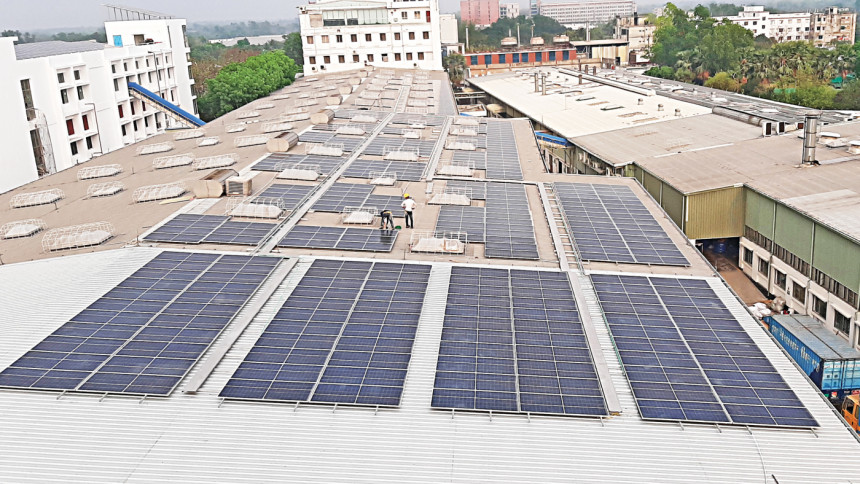Rooftop solar panels reduce a significant portion of the energy cost of industrial users and enhance their green credentials, says an expert. The photo was taken from the factory of Fakhruddin Textile Mills Limited in Sreepur upazila of Gazipur yesterday. Photo: Abu Bakar Siddique Akand
There is a growing interest among textile and garment entrepreneurs to install solar panels on their factory's rooftop in order to meet a portion of their demand for electricity while also reducing carbon emissions.
Until now, 41 firms have installed solar panels on their factory rooftops with a combined power generation capacity of 50 megawatts (MW). Of the firms, 70 per cent are engaged in making garments.
The Infrastructure Development Company Ltd (Idcol), a state-run non-bank financial institution, financed up to 80 per cent, or Tk 300 crore, of the installation cost for the panels in a bid to reduce the cost of power and develop green factories for a sustainable environment.
The rest was borne by the businesses themselves. This was disclosed at a workshop on the prospects and benefits of installing industrial rooftop solar systems, organised by Idcol at InterContinental Dhaka yesterday.
According to Idcol, it takes Tk 6 core to establish a rooftop solar power system with the capacity to generate 1MW of power. The per unit power generation cost of rooftop solar power systems is only Tk 6.5, which is lower than gas or oil-based power plants.
"Solar rooftop systems can be a cost cutting measure to reduce industrial electricity costs," said Abdur Rouf Talukder, senior secretary of the finance division. The cost of electricity obtained from rooftop solar power systems is now about 20 per cent lower than the grid electricity tariff.
"It is also expected that solar photovoltaic (PV) based electricity will become cheaper than the power generated from natural gas in coming years," Talukder added.
According to Talukder, installing solar panels on the roofs of garment factories will not only reduce operational costs, but also assist the government in cutting the cost of imported fuel in the future.
It is worth mentioning that more than 1,000MW of rooftop solar systems can be installed on the unused roofs of garment and textile industries alone, Talukder said.
Fatima Yasmin, secretary of the Economic Relations Division (ERD), said the government has made solar power more economical through the net energy metering policy that allows industries to sell their excess solar energy production to the national grid.
Besides, the price of solar technology has also declined. Rooftop solar systems are successful in reducing a significant portion of the energy cost of industrial users, and enhance their green credentials, she added.
Abdul Baki, additional secretary of the ERD and director of Idcol, said the state-run non-bank has financed 26 mini solar grid projects in different remote river islands of the country.
These grids provide electricity to over 120,000 rural people for their income generating activities.
Till date, Idcol has financed more than 1,500 large solar irrigation pumps across the country, helping about 60,000 farmers enjoy irrigation services year-round in an environment-friendly manner.
The price of solar equipment in Bangladesh has fallen significantly over the past decade while the price of grid electricity increased by an average of 5 per cent annually at the same time.
Alamgir Morshed, executive director and chief executive officer (CEO) of Idcol, said everyone will gradually adopt green power due to its cost efficiency.
Idcol is providing both financial and technical support to promote solar rooftop plants, he added.
Among others, SM Moniurl Islam, deputy CEO of Idcol, and Syeda Masarrat Quader, regional public affairs manager of H&M Bangladesh, addressed the workshop.
H&M PROMOTING ROOFTOP SOLAR
Swedish multinational clothing brand H&M is promoting the use of rooftop solar technology among its enlisted garment makers in Bangladesh.
Idcol had organised the second workshop on the installation of industrial rooftop solar systems with participation of officials of local H&M garment suppliers.
The H&M officials discussed the installation of rooftop solar systems with their local suppliers.
Like the first workshop, this one was also focused on the net metering benefits for industries, and discussed how rooftop solar projects can help H&M's local supplier base reduce their carbon footprint and get more work orders from international buyers.
A total of 46 textiles and garment manufacturers from whom H&M sources apparel products took part in the workshop.
Recent News
-
-
সেচ-পাম্প চলবে সৌরশক্তিতে Jul 16, 2023
-
-
-



